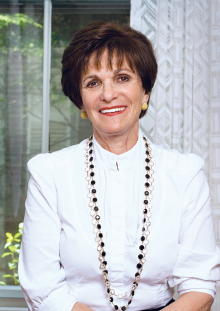Former Massachusetts First Lady Kitty Dukakis is scheduled to speak at a special session at this year’s Annual Meeting on the benefits of electroconsulsive therapy (ECT) and the need to destigmatize this often misunderstood but extremely effective tool in psychiatry’s armamentarium.
The goal of the session, titled “Reexamining ECT: From Patient Perspectives on Stigma to Benefit for Veteran Mental Health,” is to increase the use of ECT in Veteran Health Administration settings so that veterans with major depressive disorder (MDD) and posttraumatic stress disorder (PTSD) can obtain more rapid relief from symptoms. A 2014 study by the Department of Veterans Affairs observed that veterans with MDD and comorbid PTSD who received an average of 6.5 ECT treatments were almost twice as likely to be alive in the eight years following treatment than their counterparts with the same diagnostic profile who did not receive ECT.
It is also hoped that ECT will become an important component of a suicide prevention strategy among veterans; according to the Department of Veterans Affairs, a veteran dies by suicide once every 65 minutes.
Dukakis stated in her 2006 book, Shock: The Healing Power of Electroconvulsive Shock Therapy, that ECT saved her life. Dukakis, wife of former Massachusetts governor and 1988 Democratic presidential nominee Michael Dukakis, wrote that for 17 years she struggled with a disabling depression as well as alcohol use disorder, and prior to that drug addiction. Although she was at an all-time low in 2001, that’s when her life took a turn for the better, she said.
“It is June 20, 2001,” Dukakis wrote, “Michael’s and my 38th wedding anniversary. It also is the end of my fourth month of depression, my crisis period. … I have run out of options, and I don’t want to drink. … The alcohol is like an amnesiac, it is able to take me away from the darkness. Last night I was so afraid I was going to drink that I had them check me in here at Massachusetts General Hospital. Today I am going to try the only thing left: electroconvulsive therapy.”
ECT was first introduced into psychiatric practices in 1938 as a treatment for depression, but by the 1960s use of the therapy—highly stigmatized as inhumane, particularly by the media—declined.
Dukakis admitted that she did have reservations for the therapy based on a brother-in-law’s experience in 1951 with ECT, which she explained had left him in a “zombielike” state. However, she attributed this particular outcome to the time period in which the treatment was given—the “Dark Ages” of the procedure, she wrote.
Of course, Dukakis’s outcome was totally different. “ECT gave me my life back,” she wrote. “I feel good, and I feel alive.”
Today, an estimated one million people worldwide are treated with ECT every year, 100,000 of whom are treated in the United States. Studies over the past two decades have shown ECT to be twice as effective as pharmacotherapy in treating major depressive disorder, as well as capable of significantly reducing suicidal thoughts in patients with severe depression (
Psychiatric News, June 19).
The Food and Drug Administration recently proposed a rule to reclassify ECT devices from Class III (high risk) to Class II (low risk). “The change would significantly improve access to an effective and potentially lifesaving treatment,” wrote APA CEO and Medical Director Saul Levin, M.D., M.P.A., and APA President Renȳe Binder, M.D., in a blog in support of the reclassification. The deadline for comments on the proposal was March 28.
Other speakers at the session will include Levin, who will give introductory comments, and Peter Hauser, M.D., a mental health services lead at the VA Long Beach Healthcare System and a clinical professor of psychiatry at the University of California, Irvine, who will chair the session. Richard Wiener, M.D., interim chair of psychiatry at Duke University, will give an overview of ECT and its use in VHA facilities and clinics, and George Petrides, M.D., an associate professor of psychiatry at the Hostra Northwell School of Medicine, will discuss the use of ECT for patients with schizophrenia. Mark George, M.D., a distinguished professor of psychiatry at the Medical University of South Carolina, will talk about another noninvasive method used to stimulate small regions of the brain, transcranial magnetic stimulation. ■
The session will be held Monday, May 16, from 9 a.m. to noon in room B407 at the Georgia World Congress Center.

